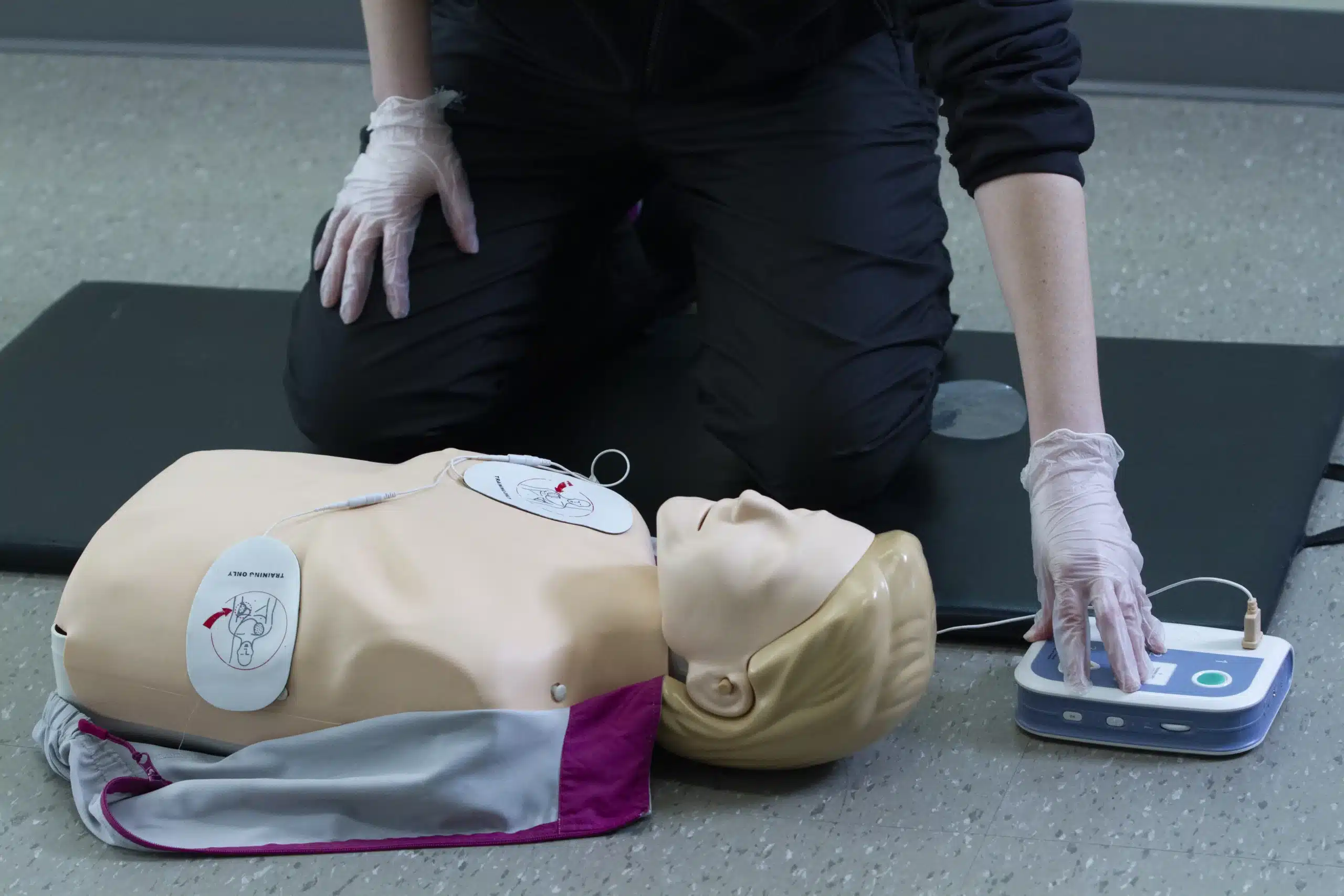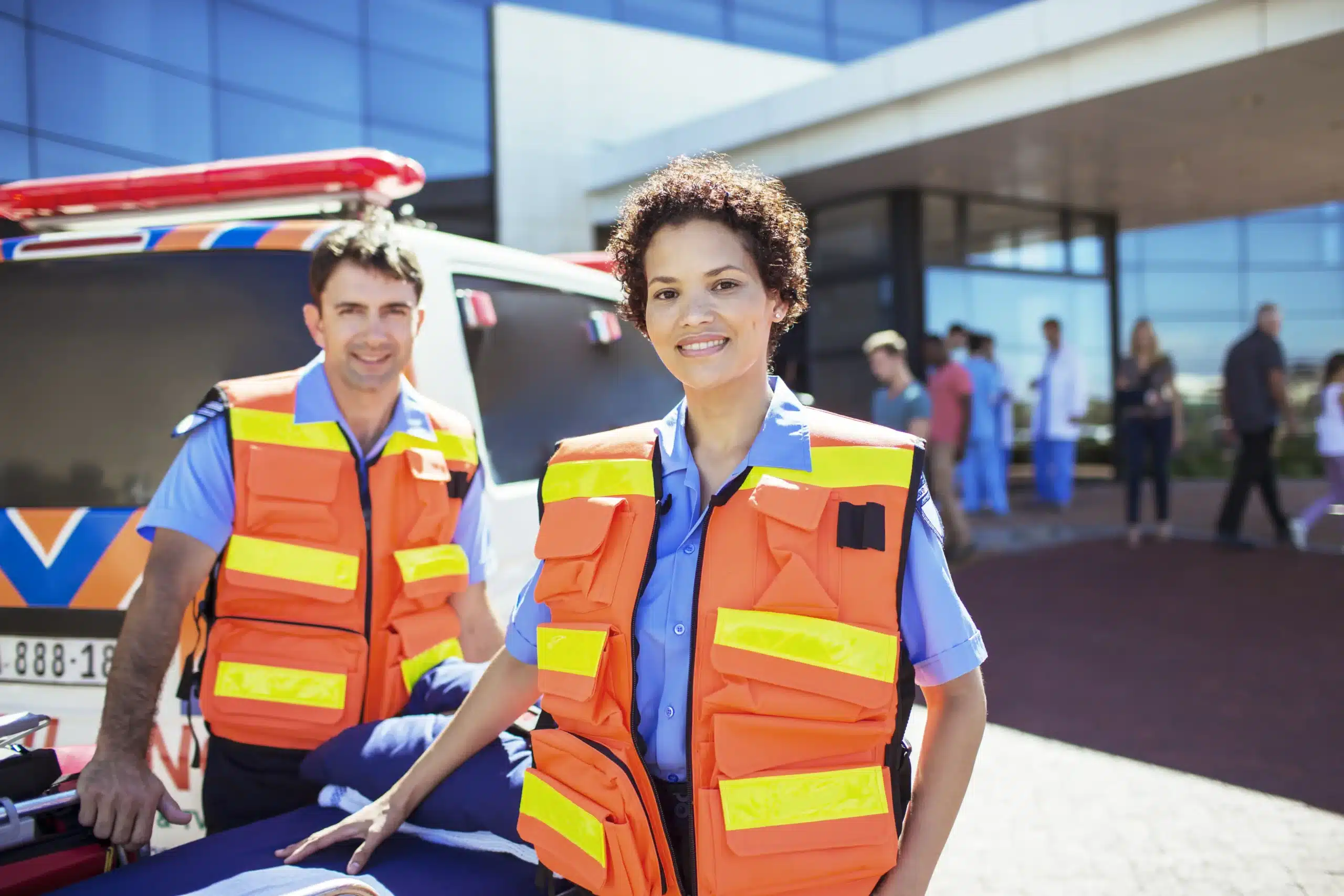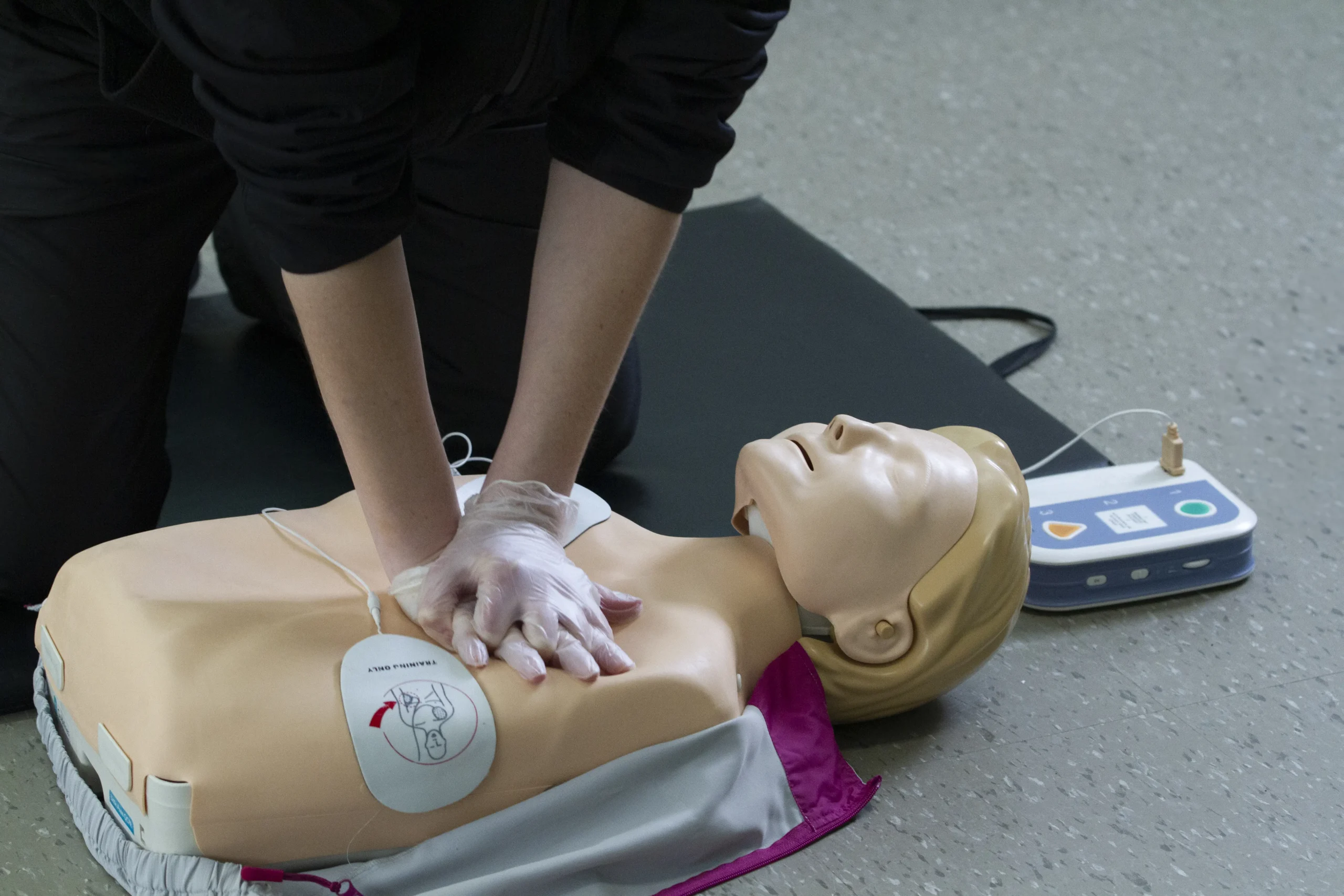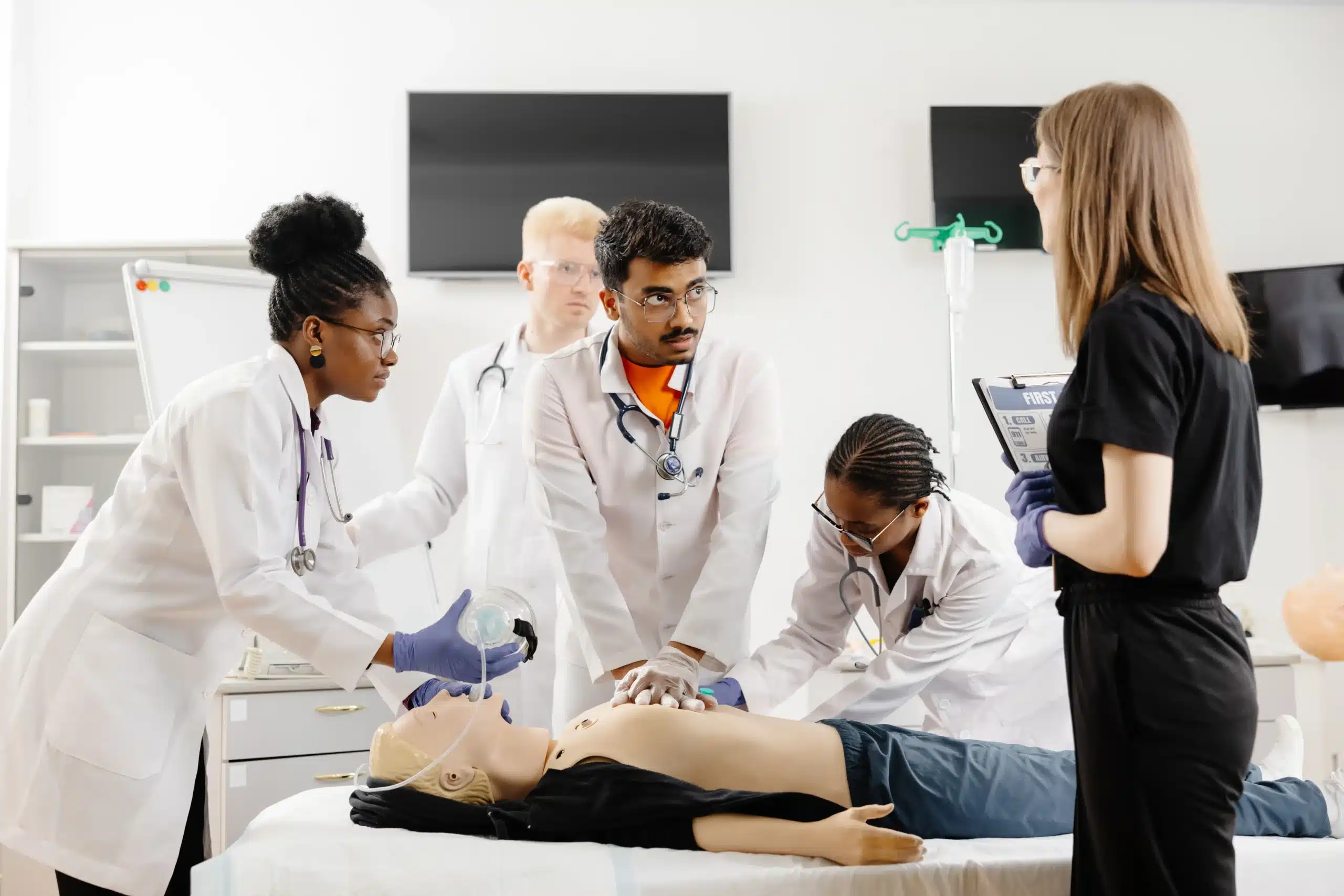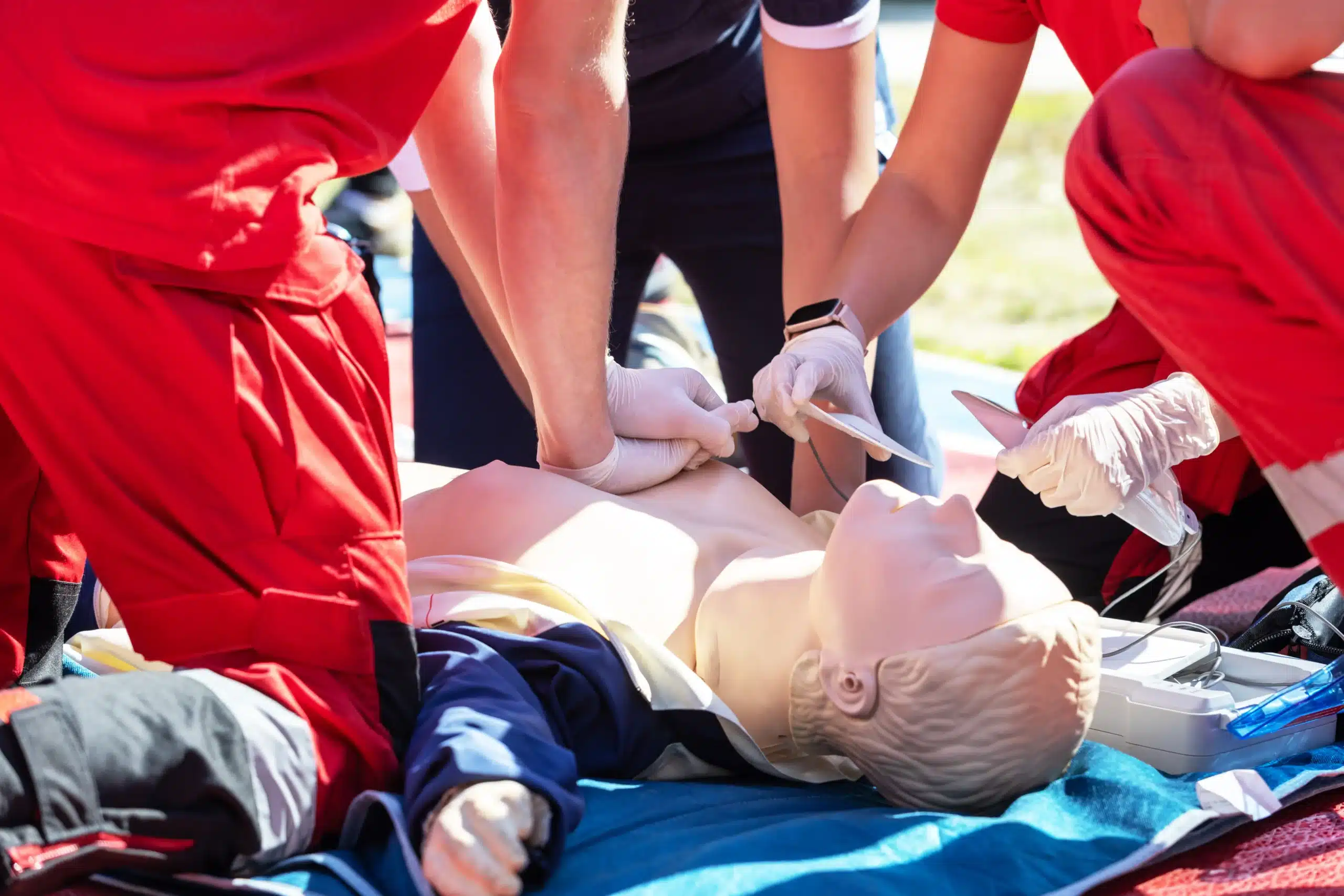Emergencies can happen anytime, anywhere. Are you ready to respond? This guide is your resource for finding top-quality CPR courses in Roseville. We’ll break down the different types of CPR training available, from basic life support to advanced certifications like ACLS and PALS, and discuss what each course entails. We’ll also explore the various training providers in Roseville, including Safety Training Seminars and the American Red Cross, and help you compare costs, schedules, and instructor qualifications. Whether you’re a healthcare provider, a childcare worker, or simply someone who wants to be prepared for anything, this guide will help you find the perfect CPR courses in Roseville to empower you to act confidently in a crisis.
Key Takeaways
- CPR Certification Empowers You: Learning CPR, whether basic or advanced like BLS and ACLS, equips you to handle medical emergencies effectively, potentially saving lives in your community. Find the right course type for your specific needs.
- Select the Best Course Format: Roseville offers various CPR course formats, including in-person, hybrid, and online options. Choose a format that complements your learning style and schedule, prioritizing hands-on practice with feedback for skill mastery.
- Stay Current and Confident: Maintain your CPR skills through regular renewal and continuing education. Refresher courses and consistent practice ensure you remain prepared and confident to respond effectively in a crisis.
What is CPR? Roseville Courses
Cardiopulmonary resuscitation (CPR) is a lifesaving technique used when someone’s heart stops beating. It combines chest compressions and rescue breaths to circulate oxygenated blood to the brain and vital organs until emergency medical services arrive. Learning CPR can dramatically improve the odds of survival during cardiac arrest, making it an essential skill.
Roseville offers a range of CPR courses designed to give you the skills and confidence to handle these emergencies. From basic CPR training to advanced certifications like Basic Life Support (BLS) and Advanced Cardiovascular Life Support (ACLS), these courses cover essential techniques. You’ll also learn how to use an automated external defibrillator (AED), a device that can significantly increase the chance of survival. Regular CPR training is crucial, helping you adapt your techniques to different situations. Taking a CPR course in Roseville means joining a community focused on safety and preparedness, ensuring you’re ready to act when it matters most.
CPR Course Types
Choosing the right CPR course is the first step. Let’s break down the different types of CPR certification available in Roseville and which one might be best for you. Safety Training Seminars offers a variety of CPR and first-aid courses to meet your specific needs. Check out our low price guarantee—we’re committed to providing affordable, high-quality training.
Basic Life Support (BLS)
Basic Life Support (BLS) provides the foundational knowledge and skills to respond to life-threatening emergencies. The BLS course covers core techniques like high-quality CPR for adults, children, and infants, along with how to use an AED and relieve choking. It’s a crucial certification for healthcare providers, and it’s also valuable for teachers, coaches, and anyone who wants to be prepared.
Advanced Cardiovascular Life Support (ACLS)
Advanced Cardiovascular Life Support (ACLS) builds upon the skills learned in BLS. Designed for healthcare professionals, ACLS training focuses on the management of cardiopulmonary arrest and other cardiovascular emergencies. It covers advanced techniques, including airway management and team dynamics during resuscitation. If you’re a doctor, nurse, paramedic, or other healthcare provider involved in emergency cardiac care, ACLS certification is essential.
Pediatric Advanced Life Support (PALS)
Pediatric Advanced Life Support (PALS) focuses specifically on the emergency treatment of infants and children. This course teaches healthcare providers how to recognize and respond to pediatric emergencies, including respiratory distress and cardiac arrest. PALS certification is vital for pediatricians, pediatric nurses, and other healthcare professionals who work with young patients.
First Aid & CPR
Combining first aid and CPR training gives you a well-rounded set of skills to handle various medical emergencies. You’ll learn how to respond to situations ranging from cuts and burns to allergic reactions. This combined course is a great option for teachers, childcare providers, workplace safety officers, and anyone who wants a comprehensive understanding of emergency response. Consider adding EMSA Child Care Health & Safety training if you work with children. For healthcare providers needing to renew their BLS skills quickly, our RQI classes are a convenient option.
Top Roseville CPR Providers
Finding the right CPR class can feel overwhelming with so many options. To help you, we’ve compiled a list of top CPR providers in Roseville. Whether you’re a healthcare professional seeking BLS certification or a parent wanting to learn CPR, this list offers various choices to fit your needs.
Safety Training Seminars
Safety Training Seminars offers American Heart Association (AHA) certified courses in CPR, BLS, ACLS, PALS, and First Aid. They also provide specialized training like the EMSA Child Care Health and Safety course for California childcare providers. With a focus on affordability, Safety Training Seminars is a practical choice for those seeking quality training that doesn’t break the bank. Check their low price guarantee.
American Red Cross
The American Red Cross is a well-known provider of CPR/AED training. With their established reputation and focus on community safety, they offer a reliable option for CPR certification. Given the hundreds of thousands of cardiac arrests that occur each year, learning CPR through a trusted organization like the Red Cross can make a difference.
NorCal CPR
NorCal Emergency Medical Training provides CPR and other emergency medical training in Roseville. As an authorized training center, they offer a variety of courses, making them a valuable resource for individuals and groups seeking comprehensive training.
Hospitals & Medical Centers
Many hospitals and medical centers in and around Roseville offer CPR training courses. These courses range from basic CPR to advanced certifications like ACLS and PALS. Learning CPR equips you with essential life-saving skills and the confidence to respond effectively during crises. Check with your local hospitals for course schedules and availability.
Compare CPR Course Costs & Value
Finding the right CPR class often involves balancing cost and value. Understanding the different pricing structures and available discounts helps you make informed decisions. Fortunately, Roseville offers various options to fit different budgets and needs.
Course Costs
Safety Training Seminars provides various CPR and first-aid courses in Roseville, from basic CPR to advanced certifications like BLS, ACLS, and PALS. They aim to offer competitive prices in Placer County, making quality training accessible. When comparing costs, consider what each course covers. A basic CPR course may cost less than a comprehensive BLS certification, but the latter offers more in-depth training.
Discounts & Packages
Look for CPR course providers that offer discounts, especially for group training. Safety Training Seminars offers discounted group rates for CPR classes in Roseville, a cost-effective choice for organizations or groups. These group training sessions provide valuable life-saving skills and foster teamwork and community preparedness. Bundling CPR with first-aid training can sometimes unlock package deals, saving you money while expanding your skill set.
Group Training
Beyond cost savings, group training offers a dynamic learning environment. Safety Training Seminars holds classes at their Roseville location, with convenient hours from 8 am to 10 pm daily. They offer a range of AHA-certified courses, including BLS, ACLS, PALS, CPR, and first-aid, seven days a week. Learning alongside others provides opportunities for collaborative practice and shared insights, enhancing the overall learning experience.
Instructor Qualifications & Course Quality
When your health is on the line, you want to know the person providing CPR training knows their stuff. Choosing a CPR class with qualified instructors and a robust curriculum is key to getting the most out of your training. Here’s what to look for:
AHA Certification
A solid indicator of quality CPR instruction is affiliation with the American Heart Association (AHA). AHA-certified instructors have completed a rigorous training program and adhere to the latest AHA guidelines. Safety Training Seminars, for example, is an AHA Training Center, meaning their courses meet these high standards. This ensures you receive top-notch instruction and a nationally recognized certification. AHA certification is often a requirement for healthcare professionals and many other fields. Check out Safety Training Seminars’ ACLS course as an example.
EMS Experience
While not always mandatory, real-world experience in emergency medical services (EMS) can significantly enhance an instructor’s ability to teach practical CPR skills. Instructors with EMS backgrounds often bring valuable insights and firsthand knowledge to the classroom, making the training more engaging and relevant. They can offer perspectives beyond the textbook, drawing on their experiences to illustrate key concepts and answer your questions. Check if the training center highlights any EMS experience within their instructor bios.
Hands-on Training & Feedback
Effective CPR training goes beyond lectures and textbooks. Look for courses that prioritize hands-on practice with feedback devices. These specialized mannequins provide real-time feedback on your compressions and breaths, helping you refine your technique and build confidence. The AHA supports the use of feedback devices in CPR training, recognizing their value in developing competent rescuers. Studies show that this immediate feedback significantly improves CPR skill acquisition and student engagement. High-quality CPR courses will incorporate these tools to ensure you’re fully prepared for a real-life emergency.
Choose Your CPR Course Format
Finding the right CPR course format is key to effective learning and skill retention. Let’s explore the different options available: in-person, online, hybrid, and fast-track.
In-Person Training
In-person CPR training remains the gold standard for learning life-saving techniques. The hands-on practice with manikins and real-time feedback from certified instructors are invaluable for mastering CPR skills and building confidence. This format allows you to ask questions, clarify doubts, and practice in a supportive environment. Given that cardiac arrests are a leading cause of death, having solid, practical skills can make all the difference. In-person training typically results in a two-year certification, meeting OSHA standards and ensuring you’re prepared for emergencies. For in-person CPR classes in Roseville, check out Safety Training Seminars.
Online Courses
Online CPR courses offer undeniable convenience and flexibility, allowing you to learn at your own pace and from anywhere with an internet connection. However, it’s important to be aware that online-only courses typically don’t offer the hands-on practice crucial for truly mastering CPR. While they can be a good starting point for learning the basics, they may not fully prepare you for real-life emergencies or meet certain workplace requirements. If you choose an online course, consider supplementing it with in-person skills practice. The American Red Cross offers a variety of online CPR resources.
Hybrid Options
Hybrid CPR courses offer a balanced approach, combining the flexibility of online learning with the essential hands-on practice of in-person instruction. You can study the theoretical components online at your convenience and then attend an in-person session to practice your skills with a certified instructor. This format is ideal for those with busy schedules who still want the benefits of hands-on learning and expert guidance. Safety Training Seminars offers hybrid courses that blend online learning with in-person skills sessions.
Fast Track RQI
For healthcare professionals needing advanced certifications like BLS, ACLS, and PALS, the Fast Track RQI (Resuscitation Quality Improvement) program offers an accelerated path to certification. This program blends online learning with a hands-on skills test using a voice-assisted manikin. The advantage? You can often achieve same-day certification, making it a highly efficient option for busy medical professionals who need to renew or upgrade their credentials quickly. Learn more about Fast Track RQI options in Roseville.
Select the Right CPR Course
Choosing the right CPR course depends on your individual needs and goals. Whether you’re a healthcare professional, need workplace training, or want to be prepared for emergencies, understanding the different options is key.
Healthcare Requirements
Healthcare professionals often need specialized training that goes beyond the basics of CPR. Certifications like Basic Life Support (BLS) and Advanced Cardiovascular Life Support (ACLS) provide advanced skills for critical situations. These certifications, along with Pediatric Advanced Life Support (PALS) and the Neonatal Resuscitation Program (NRP), give healthcare providers the training to confidently handle complex medical emergencies.
Workplace Safety
Many workplaces require employees to have CPR and first aid training. This focus on safety creates a more prepared workforce for on-the-job incidents. The American Heart Association recommends using feedback devices in CPR training to make it more effective. These devices give real-time feedback, helping you develop consistent, high-quality CPR skills.
Personal Preparedness
Knowing CPR and first aid can make a real difference in personal emergencies. These skills allow you to respond quickly and confidently in a medical crisis, potentially saving a life. CPR and first aid training gives you the knowledge and skills to respond effectively until professional help arrives. Consider taking a course to gain the confidence and skills to handle unexpected emergencies.
CPR Certification’s Impact in Roseville
CPR certification is essential in Roseville, impacting both individual and community well-being. Understanding local regulations and the broader community benefits highlights the importance of CPR training.
Local Regulations & Requirements
Many professions in Roseville, particularly in healthcare and childcare, require CPR certification. Safety Training Seminars, an American Heart Association Training Center, offers various courses in Roseville, from basic CPR to advanced certifications like BLS, ACLS, and PALS. These courses adhere to AHA standards, ensuring high-quality instruction and valid certification. Medical professionals can maintain their BLS, ACLS, and PALS credentials through the efficient RQI program. Childcare providers in Roseville can benefit from the EMSA Child Care Health & Safety course offered by Safety Training Seminars.
Community Benefits
Beyond professional requirements, CPR certification empowers individuals within their community. Group CPR training equips Roseville residents with the skills to respond effectively to emergencies. Knowing CPR transforms bystanders into potential lifesavers, bridging the gap between an emergency and the arrival of first responders. This immediate action can dramatically improve survival rates, especially during sudden cardiac arrest. CPR-trained individuals provide a crucial first line of defense, offering immediate assistance and increasing positive outcomes. Widespread CPR knowledge creates a safer, more resilient Roseville community, where people are prepared to help during a crisis. Safety Training Seminars’ commitment to affordable pricing makes these vital skills accessible to more people.
Maintain Your CPR Certification
CPR skills are like any other—they can fade if you don’t use them regularly. Staying current with your CPR certification isn’t just about having a valid card; it’s about being confident and prepared to act quickly and effectively in a real emergency. This section covers how to keep your skills sharp and your certification up to date.
Renew Your Certification
CPR certifications are typically valid for two years. The American Red Cross recommends renewing your certification regularly, as skills can diminish over time. Even if you haven’t used your CPR training recently, staying certified ensures you’re familiar with the latest guidelines and techniques. Check with your certifying organization, such as the American Heart Association or the American Red Cross, for renewal requirements and course availability. Safety Training Seminars offers a variety of renewal courses, including BLS, ACLS, and PALS, to help you easily maintain your credentials. Our low price guarantee makes staying current with your certification affordable and accessible.
Continuing Education
Regular training beyond your certification renewal is key to maintaining effective CPR skills. MyCPR NOW emphasizes practicing CPR techniques and adapting them to different situations. Think of it like a dress rehearsal—the more you practice, the better prepared you’ll be to respond confidently in a real emergency. Consider participating in refresher courses or workshops that focus on real-life scenarios. The American Heart Association highlights the benefits of using feedback devices in CPR training to improve the quality and consistency of compressions. Studies also show that peer feedback, such as video recording during practice sessions, can significantly improve skill retention. Look for courses that incorporate these techniques to get the most out of your training.
First-Time CPR Course Advice
Getting ready for your first CPR class? It’s normal to feel a little nervous, but being prepared can make a difference. Here’s what you can expect and some tips to help you succeed.
What to Expect
CPR training gives you the skills to handle emergencies. You’ll learn life-saving techniques, from the basics of CPR to more advanced certifications like ACLS and PALS. Most importantly, you’ll gain the confidence to respond effectively under pressure. Expect a combination of instruction, demonstrations, and hands-on practice. You’ll work with mannequins to simulate real-life scenarios.
Learning Tips
Regular CPR training is key to responding effectively in a crisis. Focus on understanding why each step is important, not just memorizing the sequence. Ask questions! A good instructor will explain how to adapt CPR techniques based on the victim’s age and condition. Pay close attention to the instructor’s feedback, especially when practicing compressions and breaths. Using feedback devices can improve the quality and consistency of your CPR skills, as highlighted by the American Heart Association.
Overcome Challenges
One of the biggest hurdles for many people is overcoming common misconceptions about CPR. Some worry they’ll do something wrong or cause further injury. Quality training programs address these fears and empower you to act quickly and confidently. Remember, any attempt at CPR is better than none. Don’t let fear hold you back from learning a skill that could save a life. If cost is a concern, look for providers like Safety Training Seminars that offer a low price guarantee.
Related Articles
- CPR Classes in Sacramento: The Complete Guide – Sacramento CPR Classes
- Why CPR Is Important in Healthcare
- BLS Classes in Sacramento: Your Complete Guide – Sacramento CPR Classes
- AHA ACLS Classes in Sacramento, CA – Sacramento CPR Classes
- PALS Classes in Sacramento, CA – Sacramento CPR Classes
Frequently Asked Questions
What’s the difference between BLS and ACLS?
BLS is the foundation for anyone who might need to perform CPR. It covers the essentials for adults, children, and infants. ACLS is more advanced and geared towards healthcare professionals, focusing on team-based resuscitation and complex cardiac emergencies. Think of BLS as the essential first aid of CPR, while ACLS is for those working in critical care settings.
How do I choose the right CPR class in Roseville?
Consider your specific needs. Are you a healthcare provider, a childcare worker, or simply someone who wants to be prepared? Think about your schedule and preferred learning style (in-person, online, or hybrid). Compare costs, look for AHA certification, and don’t hesitate to contact training centers directly to discuss your options. Safety Training Seminars, for example, offers a range of courses and a low price guarantee.
Why is hands-on practice so important for CPR training?
CPR involves physical techniques that require proper form and coordination. Hands-on practice with feedback devices allows you to develop muscle memory and receive real-time feedback on your compressions and breaths. This makes you much more likely to perform CPR effectively in a real emergency. It’s like learning to ride a bike – you can’t just read about it; you have to do it.
What if I’m nervous about taking a CPR class?
It’s completely normal to feel a bit apprehensive, especially if you’re new to medical training. Remember, CPR instructors are there to support you. They’ll guide you through each step, answer your questions, and create a safe learning environment. Focus on the fact that you’re gaining a valuable skill that could one day save a life.
How can I make sure my CPR skills stay sharp after I get certified?
Regular practice is key. Consider taking refresher courses or practicing with friends or family. You can also find online resources and videos that demonstrate proper CPR techniques. Think of it like any other skill – the more you use it, the more confident and effective you’ll become.


